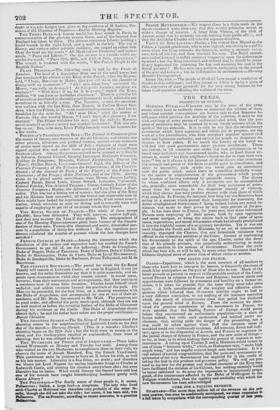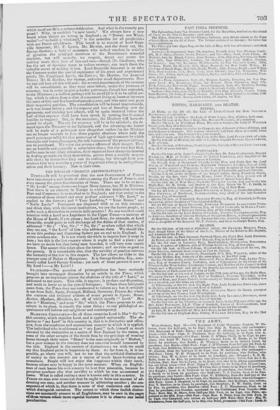was scalking with the late King, then Regent, in Carlton
House Gar- ISIonsstero HERALD—Whatever may be the issue of the great dens, when the Prince, in his most condescending manner, asked her to events which have so suddenly risen to confound the wisdom of man, breakfast for the next day. "Ah ! num Dien," cried Le author of and whose remoter consequences are known only to that Supreme In. Corinna, like • the worthy Mayor' " I can't have that pleasure ; I am telligence which governs the destinies of the universe, it must be the engnged." The Prince withdrew his arm, and the unlucky Baronne wish and hope of every person of well-constituted mind, that the *- never received another courtesy nor another invitation ! This was act-
ing en roi. But, to be sure, Louis Philip has only worn his gress of revolution may be arrested by those timely reforms which the honours for spirit of the age demands. It is in vain to say that the revolutionary a
which itself exhibits a serious defalcation. And what is the remedy pro- posed ? Why. to establish "a new board.' We always have a new board when things go wrong in England ; as " Bowen een Wind. molee"—" to build a wind-mill," is the remedies for all perplexities with our Dutch neighbours. This board is to consist. of Lord Gran- ville Somerset, Mr. F. Lewis, Mr. Herries, and the decoy rat, Mr. George Bankes ; a body of statesmen who indeed emulate in activity of gyration the principal members of the Dutchman's remedial machine, but will scarcely, we suspect, detect any secret for making more than four of two and two—though Mr. Goulburn, who has the art of devising taxes to reduce revenue, can teach them the valuable secret of making it less. Lord Granville Somerset is to take the Customs under the special cognizance of his great and experienced mind ; Mr. Frankland Lewis, the Excise ; Mr. Herries, the Assessed Taxes ; Mr. G. Bankes, the Stamps, and other small departments. Now we can tell how all this will end : the several departments of the revenue will be consolidated, as they were once before, under the pretence of economy, but in order to give a higher patronage, though less extended, to the Ministers ; a million perhaps will be saved (if it is to be called saw- lug, which is taken from a class of consumers living at home at between the rates of fifty and five hundred pounds a-year, and who must now go to their respective parishes. The consolidation will be found impracticable, as it was found before ; and the expense and loss of founding new de- partments, and training new officers, will be again incurred before the half of that expense shall have been saved, by turning five thousand families to beggary. But, in the meantime, the Ministry will have ob- tained its object. The cry for economy will be so far satisfied ; the de. mend upon the Treasury so far lightened, and the advantageous barter will be made of a patronage now altogether useless (as the Minister can no longer venture to face those popular elections where only the small patronage tells) for that patronage of high appointments by which
boroughs and boroughmongers, the sole buttresses of the present cabinet, can be pmvhased. We warn the revenue officers of their danger. They are an humble and generally a submissive class ; but the very fact that, unlike men in any other situation, their superiors have always an interest in finding pretexts for their destruction, proves them a morally respect- able class e by themselves they can do nothing, but through their con- nexions they may exercise a power of important efficacy in saving them- selves and their country. Now is their time.
THE ENGLISH "MORGUE ARISTOCRATIQUE."
TIMES—It will be perceived that the new Government of France have introduced a new mode of address among the Peers of France, and even among the great functionaries of State. There are to be no more "My Lord's" among them—no longer Monseigneur, but M. le Ministre. Now there is no country in Europe in which the distinction between Peer and Commoner is so marked as in England; and that owing to the existence of those absurd and even profane addresses "My Lord." as applied to the former ; and "Your Lordship," "Your Grace," and "Noble Lords." Foreigners are disgusted with us on this account ; and think that, with the freest institutions, we are the basest people, to suffer such a distinction to exist in daily practice ! No one would or could interfere with a Lord as a Legislator in the Upper House—a member of the House of Lords, if you please; but Lord' Grey, for example, or Lord Grenville' would quite as well discharge all the duties of that station, if addressed "Sir '• • Yes, Sir ;" "No, Sir ;" as when called that which they are not, "the Lord" of him who addresses them. We should like to see this profane and disgusting foolery put an end to in England. It exists nowhere else. It is not worth the while to inquire how it crept in here ; but this is the last country where it ought to find a place ; and we have no doubt but that being once branded, it will very soon vanish hence. The sooner this takes place the better ; and no time so good as the present. It is remarkable also, that the servility of practice outruns the formalityof the law in this respect. The law allows no titles to the younger sons of Dukes or Marquisses. It is George Gordon, Esq., com- monly called Lord George Gordon : yet each of these persons is now a My Lord I—a My Lord !
STANDARD—The question of primogeniture has been curiously brought into newspaper discussion by an article in the Times, which proposes as an important reform the abolition of the title of" Lord," as addressed to our peers. This title, it appears, is profane and disgusting, and tends to lower us in the eyes of foreigners. Where those foreigners come from, the Times does not condescend to inform us ; but it certainly is not from Italy, Spain, Portugal, Holland, Germany, France.-&c. where the common and ordinary address of every person is Signor, Senor,
Senhor, Mynheer, Meinherr, &c. all of which signify ," Lord." Don
also is " Dominus," and even " Sir," which the Times proposes to sub-
stitute in its place, is exactly the same thing ; as any philological ac- quaintance will inform our neighbour and contemporary.
MORNING CintoeticLe—In all those countries Lord is like" Sir" in this country, which signifies Lord, and is applied universally. The ob- jection to " my Lord" in this country is, that it is distinctive and offen- sive, from the cumbrous and ostentatious manner in which it is applied. The individual who is addressed as " my Lord." feels himself as much elevated by the distinction as a native of New Zealand by the tattoo, or some of the other savages of the South Seas by the privilege of wearing bones through their noses. "Dame" is the same originally as" Madam," but a poor woman in the country does not conceivelierself honoured by the title. England is the country of distinctions ; we wish we could say that England gains in happiness by them. So far from it, it is im- possible, go where you will, not to see that the artificial distinctions of society in this country are a source of much heart-burning and uneasiness. People will not enjoy the happiness within their reach, because others may be happy in the same manner. When an English- man of rank leaves his own country he is at first miserable, because he perceives nowhere- else that Servility to which he was accustomed at home, What is called cutting a man is known only in thisveuntry. In France no Man ever conceives that he ought to have one manner of ad- dressing one man, and another manner in addressing another ; the con- sequence-of which is' that there is none of that constraint and reserve which distinguish ourselves. The extent to which these foolish distinc- tions are eo- nstantly present to all Englishmen, may be seen in the pages of those writers whose more especial, business iris to observs our. social
peculiarities. -• - •



























 Previous page
Previous page